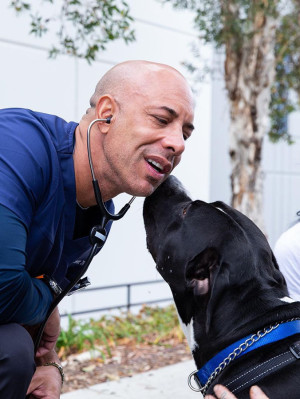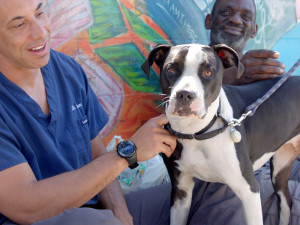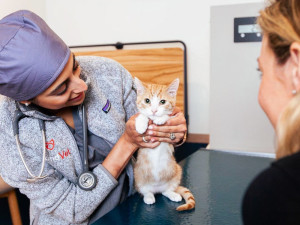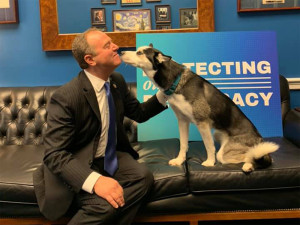Project Street Vet Is Helping Unhoused Pets—And Their Parents
Vet tech Genesis Rendon shares the challenges and rewards that come with her selfless work.
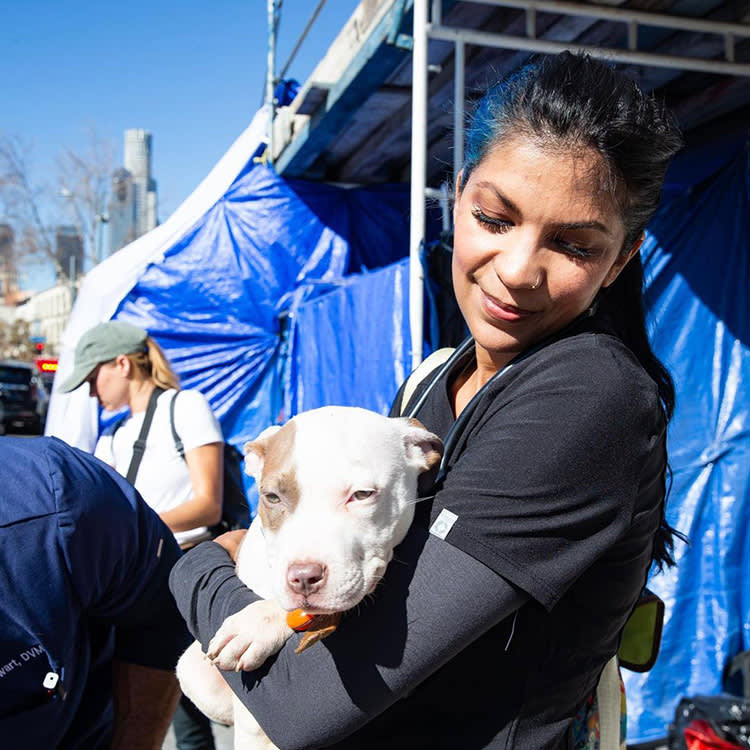
share article

Your pet wants you to read our newsletter. (Then give them a treat.)
If you’re a fan of Project Street Vetopens in a new tab — and if you aren’t, you will be — you may have spotted anincredibly compassionateopens in a new tab person with unmistakable Technicolor streaks in her hair, vibrantly offsetting her earthy-toned scrubs on their Instagram. That woman isGenesis Rendonopens in a new tab, who ventures to underpasses, riverbeds, sidewalks, and other homeless encampments in Southern California almost daily, alongside Dr. Kwane Stewartopens in a new tab (aka the Street Vet), to help the unhoused and their pets.
Rendon, a registered veterinary tech who lives in Long Beach, California, always knew she wanted to work in medicine. In fact, she started out in nursing school, until her love of animals drew her into the veterinary world. (She currently comes home to a talkative Chihuahua named Pickles.) She is a passionate, proactive presence who can be found doing everything from patching up wounds to administering IVs to simply comforting sick pets. And as a Latina woman, her presence can be extra-effective. “A lot of the people that we meet speak Spanish,” she tells The Wildest. “One particular woman’s dog had cancer, and I was able to be there for her and translate for the doc.”
We caught up with Rendon for an emotional chat about her devotion to helping the most helpless of pets and how she often finds herself bonding just as intensely with their unhoused owners.
What is the difference between a vet tech and a nurse?
Technicians are fighting for us to be seen as nurses, because we do the same thing as human nurses: IV catheters, calculation for drugs, using all the IV pumps, suturing. But we’re not recognized as that, because we work with animals. But I always say we work more than just one species. You know, when I run anesthesia on a cat, it’s different from a dog versus a puma versus a gorilla versus a hyena versus a turtle or a hamster.
What is your job now?
My full-time job is working with insurance for animals, to help pet owners know that there is financial support out there. I also do relief work here and there for hospitals. And then, with Dr. Kwane, we’ll just travel the streets of Long Beach, Skid Row, Venice, wherever we can go to look for the unhoused who need support for their pets. I met Dr. Kwane many, many, many moons ago at a gala. At the time, he was working for the ASPCA as a doctor that helps pets on-set for movies. We were just talking and became friends. I was nominated for Hero Tech of the Year. I didn’t win.
How did you start working together?
I used to do this before I even met Dr. Kwane. I always needed a doctor, and then Dr. Kwane was like, “Well, I need an assistant. I need help out here, too.” We just started helping each other. Our relationship is great. We’re like brother and sister. I am very grateful for Dr. Kwane because I wouldn’t be able to do what I do without him. And I hope, vice versa.
What challenges do you face each day?
I’m sorry, I get emotional. We try to do the best that we can. For those that are unhoused, it’s tougher because they’re with their pet every single day. The hard part is when they need the support and can’t get it. We see them taking better care of their pets than those that do have a roof over their head. With some, it keeps them responsible, not drinking or using drugs because they have something to live for and to take care of. They love their companions. This is why I love this mission.
What is the compassion fatigue like?
The compassion fatigueopens in a new tab in our industry is pretty major. And unfortunately, the suicide rate is really high. It depends on which department you work in. I also worked in radiation oncology, and that took a toll on me because you fall in love with your patients. Unfortunately, cancer wins sometimes. Hours can be long.
You may have to euthanize animals. And you’re not able to eat or even use a restroom. Money is also a big issue. A lot of the time, it could be the simplest fix, but the pet owner can’t afford to do it. So we have to euthanize a pet. Or those animals become homeless, and they have to take them to a shelter. That’s where it becomes hard: We can’t save them all.
It’s moving to see you get emotional just talking about this.
Dr. Kwane is definitely the stronger one. I have seen him cry, though. He gets teary-eyed as well. But he doesn’t show it all the time. I’m a crier when we’re with patients. But I did catch him tearing up once, and he’s like, “Genesis, look what you’re making me do...”
What do you do when the job gets depressing?
Back in the day when I first started, we didn’t have support. I’d go home just numb, no emotions. I didn’t want to have relationships with anybody. You just go home, and you deal with it. There’s more support now for us in the veterinary field. It’s calledNot One More Vetopens in a new tab. They help those that do feel like they’re not worthy, not doing enough, or no longer want to be here. They’ve been a great support. I’m very grateful for Not One More Vet. They’ve supported so many people and brought to light that compassion fatigue is real.
How do you approach the unhoused?
Oh my gosh, that’s the best part. They are so grateful…even for a bag of food! And the fact that we’re taking the time to speak to them is what they love the most. Even those that don’t have animals come out and want to see what we’re doing. They have so much faith, and that’s something that I always appreciate.
We learn a lot from speaking to the people that we’re helping because we have roofs over our heads and sometimes just complain about life. When we give their pets a vaccine or clip their nails or give them medication, we see so many of them crying and saying, “Thank you for being out here. Thanks for not ignoring us.” That’s an amazing feeling.
Can you tell me a little more about even one of these folks?
Hector’s one of them. He is from Colombia. When it was raining really hard a few months ago, a lot of water was going into his tent. And he had [his pet] Luna who was sick — skin and bones. Dr. Kwane just happened to pass by and save Luna.
Shay is another person I got very, very close with. Her dad had just passed away, and mom and her decided to get away — just to travel away from the loss of her father. They were living out of their car, and they had a dog named Shiloh.
We were able to help Shiloh. We spayed her, gave her a dental, and we provided surgery for an umbilical hernia. And I bought [Shay] a bunch of stuff: bras, sanitary napkins, wash cloths, and clothes. We give to the humans as well. I’ve [also] learned when the unhoused have pets and are asking for money, I know there’s 110 percent they will feed their dog or cat before they feed themselves.
The Street Vet is a non-profit initiative that operates on donations. If you’d like to help, you can contribute money, volunteer your time, or shop at their store.

Nisha Gopalan
Nisha Gopalan has been a writer/editor for The New York Times, New York magazine, Entertainment Weekly, Variety, The Hollywood Reporter, and NYLON magazines. She currently resides in Los Angeles.
Related articles
![Dr. Kwane Stewart and a large black dog.]() opens in a new tab
opens in a new tabAdd The Street Vet’s New Book to Your Summer Reading List
What It Takes to Save a Life: A Veterinarian’s Quest for Healing and Hope will help you see pet parenthood with new eyes.
![dr kwane street vet]() opens in a new tab
opens in a new tabDr. Kwane Hits the Streets to Treat Unhoused People’s Pets
“The Street Vet” on his heroic work and how you can help.
![A smiling veterinarian holding a cat]() opens in a new tab
opens in a new tabVets Are at High Risk For Compassion Fatigue—Here Are 4 Ways You Can Help
It’s extra important to be nice to the vet in your life.
![adam schiff and husky]() opens in a new tab
opens in a new tabTwo New Federal Bills Aim to Keep Pets and Their Families Together
Adam Schiff’s The Pets Belong with Families Act and the PUPP Act would make housing more inclusive for pets and people.
![Two women and a man in glasses sitting in front of a decorated and brightly lit Christmas tree while the central woman holds a Shiba Inu dog looking directing at the viewer]() opens in a new tab
opens in a new tabHow 6 Orgs Find Joy and Help Adoptable Animals During the Holiday Season
The holiday season is not so jolly for a lot of pet rescues. Here’s how they help their animals — and their volunteers and staff members — this time of year.
